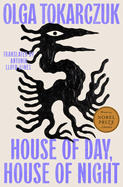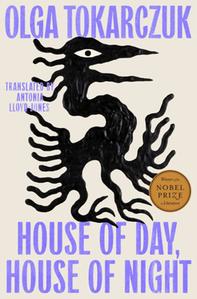
 Polish Nobel laureate Olga Tokarczuk (Drive Your Plow over the Bones of the Dead) has described her literary works as "constellation novels," a label that fit her 2018 novel, Flights, winner of the Man Booker International Prize. To the extent that term describes a collection of often seemingly disparate narrative strands that invites the reader to assemble them into patterns of meaning, it's also an apt characterization of House of Day, House of Night, originally published in Poland in 1998. Antonia Lloyd-Jones's English translation is a beautifully allusive collage of fully formed short stories, memorable character studies, and glimpses of small-town life.
Polish Nobel laureate Olga Tokarczuk (Drive Your Plow over the Bones of the Dead) has described her literary works as "constellation novels," a label that fit her 2018 novel, Flights, winner of the Man Booker International Prize. To the extent that term describes a collection of often seemingly disparate narrative strands that invites the reader to assemble them into patterns of meaning, it's also an apt characterization of House of Day, House of Night, originally published in Poland in 1998. Antonia Lloyd-Jones's English translation is a beautifully allusive collage of fully formed short stories, memorable character studies, and glimpses of small-town life.
Tokarczuk's novel is set in the region of Silesia, located in southwest Poland adjacent to the Czech Republic, and specifically the territory surrounding the town of Nowa Ruda, near her current home. Anchoring it are an unnamed contemporary narrator and her neighbor, an elderly woman named Marta, best known for her skill as a wigmaker and her familiarity with the local flora, including mushrooms that range from deliciously edible to deadly. In the nearly one hundred sections that compose the novel, the narrator intermittently recounts her interactions with Marta, who reminds her that "people are like the ground they live on, whether they like it or not, whether they are aware of it or not," one of the bits of modest wisdom she dispenses.
The novel comes to life in its assortment of diverse short stories, some of them self-contained and others segmented throughout the book. Among the most striking involves Paschalis, a young monk who makes it his mission to secure sainthood for Kummernis, a beautiful woman from the medieval period crucified by her father after she miraculously grows a beard resembling Christ's to thwart his demand that she marry one of his fellow knights. As Paschalis immerses himself in her complex story, he grapples with his own sexual identity.
The story of the oddly named classics teacher Ergo Sum, a man haunted by his participation in an episode of cannibalism in World War II, offers a terrifying portrait of the overwhelming power of guilt. There's also the tragicomic tale of a German man, a former resident whose death near the Polish/Czech border during a nostalgic return visit with his wife provokes a crisis for the respective countries' border guards.
Spanning hundreds of years of history, House of Day, House of Night pulses with the power of dreams, visions, and symbols. There's nothing extraordinary about the region in which it's rooted, or the modest lives of the people who live there, but in the hands of Olga Tokarzcuk their stories flourish. --Harvey Freedenberg, freelance reviewer
Shelf Talker: Polish Nobel Prize winner Tokarczuk delivers another impressionistic, collage-style novel rooted in the lives of the inhabitants of her native region.

